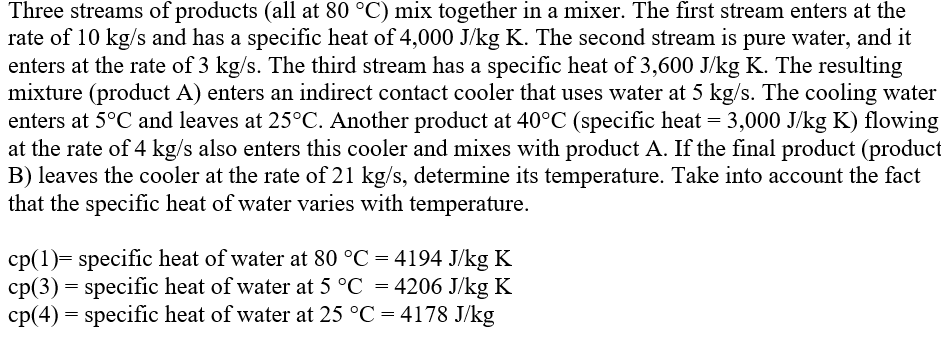Three streams of products (all at 80 °C) mix together in a mixer. The first stream enters at the rate of 10 kg/s and has a specific heat of 4,000 J/kg K. The second stream is pure water, and it enters at the rate of 3 kg/s. The third stream has a specific heat of 3,600 J/kg K. The resulting mixture (product A) enters an indirect contact cooler that uses water at 5 kg/s. The cooling water enters at 5°C and leaves at 25°C. Another product at 40°C (specific heat = 3,000 J/kg K) flowing at the rate of 4 kg/s also enters this cooler and mixes with product A. If the final product (product B) leaves the cooler at the rate of 21 kg/s, determine its temperature. Take into account the fact that the specific heat of water varies with temperature. cp(1)= specific heat of water at 80 °C = 4194 J/kg K cp(3) = specific heat of water at 5 °C = 4206 J/kg K cp(4) = specific heat of water at 25 °C = 4178 J/kg
Three streams of products (all at 80 °C) mix together in a mixer. The first stream enters at the rate of 10 kg/s and has a specific heat of 4,000 J/kg K. The second stream is pure water, and it enters at the rate of 3 kg/s. The third stream has a specific heat of 3,600 J/kg K. The resulting mixture (product A) enters an indirect contact cooler that uses water at 5 kg/s. The cooling water enters at 5°C and leaves at 25°C. Another product at 40°C (specific heat = 3,000 J/kg K) flowing at the rate of 4 kg/s also enters this cooler and mixes with product A. If the final product (product B) leaves the cooler at the rate of 21 kg/s, determine its temperature. Take into account the fact that the specific heat of water varies with temperature. cp(1)= specific heat of water at 80 °C = 4194 J/kg K cp(3) = specific heat of water at 5 °C = 4206 J/kg K cp(4) = specific heat of water at 25 °C = 4178 J/kg
Introduction to Chemical Engineering Thermodynamics
8th Edition
ISBN:9781259696527
Author:J.M. Smith Termodinamica en ingenieria quimica, Hendrick C Van Ness, Michael Abbott, Mark Swihart
Publisher:J.M. Smith Termodinamica en ingenieria quimica, Hendrick C Van Ness, Michael Abbott, Mark Swihart
Chapter1: Introduction
Section: Chapter Questions
Problem 1.1P
Related questions
Question
Please include your diagram, mass balances, and full work. Thank you.

Transcribed Image Text:Three streams of products (all at 80 °C) mix together in a mixer. The first stream enters at the
rate of 10 kg/s and has a specific heat of 4,000 J/kg K. The second stream is pure water, and it
enters at the rate of 3 kg/s. The third stream has a specific heat of 3,600 J/kg K. The resulting
mixture (product A) enters an indirect contact cooler that uses water at 5 kg/s. The cooling water
enters at 5°C and leaves at 25°C. Another product at 40°C (specific heat = 3,000 J/kg K) flowing
at the rate of 4 kg/s also enters this cooler and mixes with product A. If the final product (product
B) leaves the cooler at the rate of 21 kg/s, determine its temperature. Take into account the fact
that the specific heat of water varies with temperature.
cp(1)= specific heat of water at 80 °C = 4194 J/kg K
cp(3) = specific heat of water at 5 °C = 4206 J/kg K
cp(4) = specific heat of water at 25 °C = 4178 J/kg
Expert Solution
This question has been solved!
Explore an expertly crafted, step-by-step solution for a thorough understanding of key concepts.
Step by step
Solved in 5 steps with 29 images

Recommended textbooks for you

Introduction to Chemical Engineering Thermodynami…
Chemical Engineering
ISBN:
9781259696527
Author:
J.M. Smith Termodinamica en ingenieria quimica, Hendrick C Van Ness, Michael Abbott, Mark Swihart
Publisher:
McGraw-Hill Education

Elementary Principles of Chemical Processes, Bind…
Chemical Engineering
ISBN:
9781118431221
Author:
Richard M. Felder, Ronald W. Rousseau, Lisa G. Bullard
Publisher:
WILEY

Elements of Chemical Reaction Engineering (5th Ed…
Chemical Engineering
ISBN:
9780133887518
Author:
H. Scott Fogler
Publisher:
Prentice Hall

Introduction to Chemical Engineering Thermodynami…
Chemical Engineering
ISBN:
9781259696527
Author:
J.M. Smith Termodinamica en ingenieria quimica, Hendrick C Van Ness, Michael Abbott, Mark Swihart
Publisher:
McGraw-Hill Education

Elementary Principles of Chemical Processes, Bind…
Chemical Engineering
ISBN:
9781118431221
Author:
Richard M. Felder, Ronald W. Rousseau, Lisa G. Bullard
Publisher:
WILEY

Elements of Chemical Reaction Engineering (5th Ed…
Chemical Engineering
ISBN:
9780133887518
Author:
H. Scott Fogler
Publisher:
Prentice Hall


Industrial Plastics: Theory and Applications
Chemical Engineering
ISBN:
9781285061238
Author:
Lokensgard, Erik
Publisher:
Delmar Cengage Learning

Unit Operations of Chemical Engineering
Chemical Engineering
ISBN:
9780072848236
Author:
Warren McCabe, Julian C. Smith, Peter Harriott
Publisher:
McGraw-Hill Companies, The